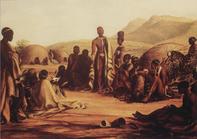Xhosa from East Africa
Historical evidence suggests that as early as 1593 there were Xhosa-speaking people as far south as the Mthatha River in the area known today as the Eastern Cape, and that they had probably already been in the region for some time prior to that.

According to oral tradition, Thembu, Xhosa and Mpondomise peoples had inhabited the upper reaches of the Eastern Cape Umzimvubu River for generations before they came down to the coast. All of this suggests that scholarly speculations about the migration of Xhosa-speaking people from East Africa in the distant past are unfounded, if not misguided or something rather more sinister.
Archaeological research, among other things, will undoubtedly cast more light on such questions in future. For example, excavations recently undertaken on the farm Canasta Place near present-day East London suggest that, since the 7th century AD, Xhosa-speaking people had been living more or less continuously near the Buffalo River.
During the 19th century Hlubi, Zizi, Tolo and Bhele peoples migrated into the region that later came to be called Transkei - now part of the Eastern Cape. These people, who subsequently became known as the Mfengu, were dependants of the Xhosa Paramount Chief Hintsa.
In 1835 they were claimed by the missionaries and the British colonial authorities as 'refugees from the Mfecane', i.e. the Zulu King Shaka's 'total war' of the late 1820s. They were brought under colonial protection primarily in order to swell depleted labour reserves.
Xhosa Chiefs Emerged as Patriots
The Mfengu people of the Transkei were military collaborators of the white settlers against the Xhosa in the Frontier Wars of 1846-7, 1850-3 and 1877-8. As a consequence of their efforts in defence of the Cape Colony, the Mfengu obtained from the white authorities grants of land which formerly belonged to the Xhosa.
In the growing confrontation on the frontier and the successive clashes with British and colonial troops, Xhosa chiefs, among them Sandile and Maqoma, emerged as patriots who were fighting to retain their independence, lands and followers.
Maqoma, a gifted strategist and hardy guerrilla fighter, died a prisoner on Robben Island in 1873. Sandile was mortally wounded in a skirmish with Mfengu conscripts in the Isidenge Forest in May 1878. With their passing so, too, the last remnants of Xhosa military resistance to colonial rule crumbled. In the early 1880s the Mpondo were the last of the Cape Nguni chiefdoms to be brought under colonial rule.